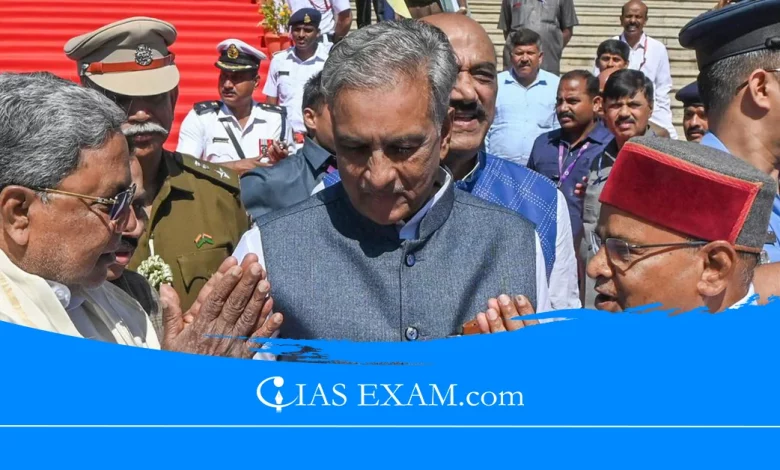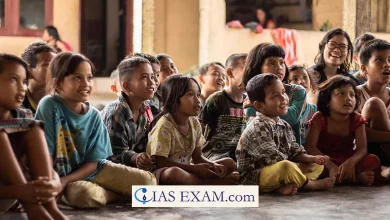Daily Current Affairs for UPSC
Karnataka Hindu Endowments Amendment Bill, 2024
Syllabus: Indian Economy, [GS Paper - 3]

Context
- Recently, The Karnataka Governor has returned the Karnataka Hindu Religious Institutions and Charitable Endowments (Amendment) Bill, 2024 bill to the congress government and asked for clarification on it. The bill was about using the maximum portion of revenue from the rich Hindu Temples to use for a common pool of funds.
Details About the Bill
- The recently passed Karnataka Hindu Religious Institutions and Endowments (Amendment) Bill 2024. The gain centres around the management as well as finances of Hindu temple institutions in the state. It should, however, be noted that the same bill has also been an issue of concern.
- In the suggested Kalamuni Raj proposal for temples tax reforms, these temples will have to collect either 5 or 10 percent of their income based on the income classification of the temples.
- The amount that is collected will be deposited in an accumulated fund that will deal with different cases and this will include paying stipends for priests, awarding scholarships for their children, and undertaking maintenance of small temples with little income.
- CPF was innovated in 2011 as the adaptation to the Karnataka Hindu Religious Institutions and Charitable Endowments Act of 1997.
- The bill on privatising temples has received severe backlash from both the BJP and Janata Dal (Secular) since the bill is termed as anti-Hindu and is being regarded as misuse of temple funds. This is in addition to the concerns about the inadequacy of the bill that only selects a particular religious institution such as Hindu temples.
- The critics also have the concern if the bill does not go up with the Indian Constitution, mainly the articles 14, 25, and 26 which ensure equality under the law, freedom of religion and the freedom to manage religious affairs. They do contend that the involvement of government in the temple matters could conflict with the law thus entailing the basic rights given.
- The bill is a clear modification of the concept of how temples in Karnataka are managed and it has inspired a heated debate on the themes of religious freedom, inter-state interference in the matters of religions, and the balanced representation of the religious entities.
Bird’s eye view about the Amendment
- Karnataka Governor Thaawarchand Gehlot sent back to the Siddaramaiah-led government a bill introducing a new set of rules that allows the endowments of richer Hindu temples to be used for the general revenue purposes as opposed to the purposes those altars previously had.
- Proposal of the Karnataka Hindu Religious Institutions and Charitable Endowments (Amendment) Act was to give away a bigger pace of earnings of temples into the common fund pool.
- The introduced proposal has the temples of all those with gross income above ₹1 crore up to be 10% of their income and 5% for the others earning between ₹10 lakh and ₹1 crore.
- This amendment suggests a change that has not been exactly the status quo where the temples offer their net incomes.
- The Supremacy of the N’ Governor’s decision to return the amendment bill is seen in the fact that it is subject to a pending Supreme Court case as well as a 2011 and 2011 amendments made similar to the pending amendment that were struck down by the Dharwad bench of the High Court.
- The Governor further observed the Congress govt with the relevancy of such laws applied to other religious bodies. While the official cites tension in the bill passage for the only case of Hindu temples.
Conclusion
- The Karnataka Hindu Religious Institutions and Charitable Endowments (Amendment) Bill, 2024, aimed to reallocate a higher portion of revenues from affluent Hindu temples into a common pool fund, was returned by Governor Thaawarchand Gehlot.
- This decision was influenced by a pending Supreme Court case related to earlier amendments and raised questions about similar regulations for other religious bodies.
- The bill’s outcome reflects the complexities of managing religious institutions’ finances and the challenges of ensuring equitable treatment across different religious groups.
Source: Deccanherald
UPSC Mains Practice Question
Q.“Examine the implications of the Karnataka Hindu Religious Institutions and Charitable Endowments (Amendment) Bill, 2024, especially in the context of secularism and the management of religious institutions in India.”[250 Words]





.png)



